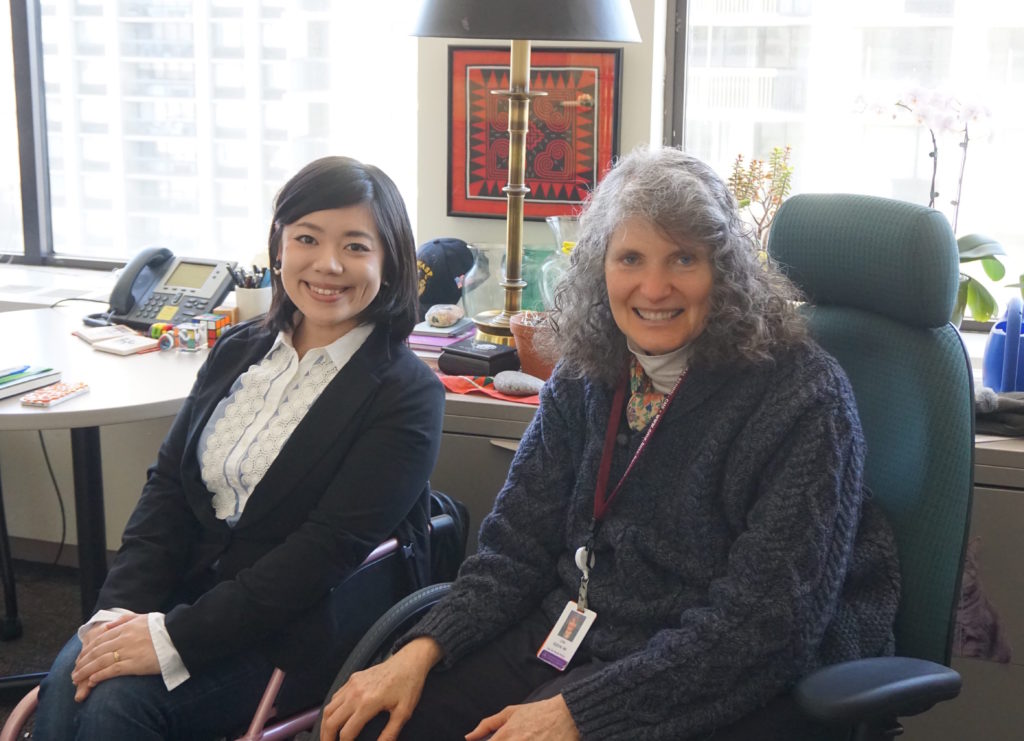この記事は次の言語でも読めます:日本語
Being a person with disabilities may be a disadvantage in workplace. Being a women also may be too. According to the latest white-paper by Gender Equality Bureau in Japan (*1), female workers in manager position are 11.3% which is much lower than other advanced counties. This shows that the Japanese working environment is not giving equal opportunities to female workers.
Today in the US, having equality is considered very important, not only to gender differences or people with and without disabilities, but also religious and race differences. However, in the past there were obvious discriminations to minorities.

Professor Lisa Iezzoni, whom I visited in Boston, works for the Massachusetts General Hospital, a major teaching affiliate of Harvard Medical School. She has multiple sclerosis and uses a wheelchair for all mobility needs. Her multiple sclerosis was diagnosed when Professor Iezzoni was a student at Harvard Medical School. It was before ADA (Americans with Disabilities Act). To practice medicine, after medical school trainees must do and internship and residency. However, the medical school refused to write a recommendation for Professor Iezzoni to apply for an internship. She therefore has never been able to practice medicine..
“The reasons for me telling you this is that ADA is really important. This will never happen to medical students today because it would be illegal. But there is still subtle workplace discrimination. I once interviewed for a job where the person who led the recruitment had not know I use a wheelchair. When I arrived for the interview, he would not look me in eye and didn’t say goodbye at the end of interview. I never heard a word in follow up from him. These kinds of discriminatory behaviors are virtually impossible to document or quantify.”
When Professor Iezzoni started her career, it was during an era when many more women began working in professional careers. Without the internship or residency training, her first job was as a research assistant. Nonetheless, she put together a proposal for federal funding to do a research project, and the day before the application was to be submitted to the funding agency, she was called by her boss’s boss who told her:
“We realized that you are a research assistant. Research assistants cannot submit grants. So I have talked to your boss (who is a man). He generously agreed to put his name on your grant of application.”
Therefore, the application went in bearing the name of her boss rather than her name, although by the time it was funded Professor Iezzoni had been promoted to Assistant Professor and so from that point onward led the study. In this workplace, she faced other difficulties and issues because of her gender and disability. It didn’t take too long for her to leave the organization.

Personally in my 2nd job, I faced huge gaps in the quality and quantity of work, compared with male workers. Sometime it was because of my gender. Sometime it was because of my disability. It could be both too. I assume that men-oriented business fields controlled by over 40 or 50 years old would still have more discriminations against female and people with disabilities. If you work in those companies for your first career, you might feel that the corporate culture is normal. However, the company I worked for my first career had a female executive officer and there were many female workers in a manager position. There was no culture that female should do this task or male should not do this task. Therefore, to me, my 2nd job environment was shocking and very uncomfortable. 1 year later, I left the job because I was sure that I cannot built a good career in the company.
Of course, I understand that some business fields gets more interests by more males than females anyway. However, it doesn’t mean that males can disrespect female in those fields. Those fields are ones which should be more careful about the attitude to females. Casual words or attitude could be really hurtful and could be a cause of leaving office. This is not only a minus of loosing talented employees, but also could lower the company’s reputation. It could be a big damage eventually.

The day before I interviewed Professor Iezzoni, April 12, was actually ”Equal Pay Day” in the US. If females and males start working on January 1, 2015, for females to earn the same amount that the males earns in 2015, she would have to work until April 12, 2016.
In Japan, the pay gap between male and female is an issue too. According to the latest data from OECD (Organisation for Economic Co-operation and Development), among 34 advanced counties in the world, Japan is the worst top 3 (*2). Japan need to improve working environment also the equality of pay gap,
Lastly, Professor Iezzoni told me,
“It has been 26 years since ADA has passed. The students who received education after ADA had more classmates with disabilities in the school. Those generations are becoming managers in companies or top executives. For example, Mark Zuckerberg, CEO of Facebook (*3), is 31 years old. I assume that there were students with disabilities in the classroom or school where Mark Zuckerberg attended. For him or other people in his generation, people with disabilities are not big deals. People in these younger generations can figure out how they can work together. As people create a better working environment for women workers, I believe that inclusive working environment can be realized as generation changes.”
Compared with US, Japan still doesn’t have an inclusive education environment for students with disabilities. However, like Professor Iezzoni said, I also think that the things will change as generations changes. Today more females go to college and get a degree which was not as common as before in Japan. Not many yet, but more students with disabilities receive general education and go to college too. Those people would input new perspectives to the society and change from the traditional ways of thinking to more equal ways of thinking. However, not only hoping for young people, but also we, the current working people, should look back how we react toward people who are different gender or have disabilities. Because more young applicants would expect equality in workplace. We should get prepared from now.
*1 The latest white-paper by Gender Equality Bureau in Japan (Japanese only)
http://www.gender.go.jp/about_danjo/whitepaper/h27/gaiyou/html/honpen/b1_s02.html
*2 OECD ”Gender wage gap”
https://www.oecd.org/gender/data/genderwagegap.htm
*3 I interviewed Facebook Headquarters. You can read the interview reports from here.
The Story Behind Facebook’s Visual Accessibility Technology ~Facebook Part 1~
Your Performance Evaluation Is Based on Your Capacity, not Your Disability ~Facebook Part 2~
